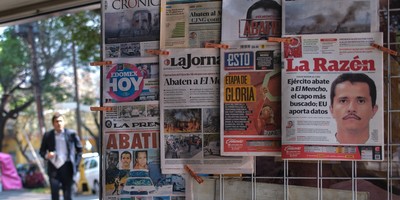Lately, the Iraq War has looked more and more like another Vietnam -- not for us, but for al-Qaida.
CIA Director Michael Hayden says the terror group has suffered "near-strategic defeat" in Iraq. It has been routed from Anbar, Diyala and Baghdad provinces, and now is getting a beating in its last stronghold of Mosul, in the north. It is reviled by the Iraqi populace, and its downward trajectory began with indigenous uprisings at its expense.
When the United States lost Vietnam, it lost credibility and saw an emboldened Marxist-Leninist offensive around the Third World. Al-Qaida is a global insurgency and not a nation-state -- and thus its circumstances are radically different from ours 40 years ago -- but it has suffered a similar reputational loss.
The Iraq War had been a powerful recruiting tool for al-Qaida when it was winning. No more. Osama bin Laden rendered what is called the "bandwagon effect" in international relations -- the tendency of states to go along with the dominant power -- in his homespun Arabic analogy of people liking the strong horse over the weak horse. In Iraq, al-Qaida's proverbial horse is a broken-down nag.
Our loss in Vietnam forever shattered the domestic consensus in favor of the Cold War, creating a crisis of national confidence known as the Vietnam Syndrome. Al-Qaida's troubles in Iraq correspond with a similar unraveling of its ideological cohesion. Reports in The New Yorker and The New Republic recently have detailed an Islamist backlash against al-Qaida's indiscriminate killing, partly attributable to its brutish campaign in Iraq.
A group devoted to overthrowing secular Arab rulers and fighting America has overwhelmingly identified itself with the mass slaughter of Muslim innocents. Its methods might not have produced revulsion in the broader Muslim world if they were succeeding. Instead, in Iraq, it's been wanton murder in a losing cause.
Recommended
Like we did in Vietnam, al-Qaida in Iraq has run afoul of nationalism and local culture, although in spectacular fashion. It has trampled on the prerogatives of tribal sheiks and issued lunatic decrees, like its banning of the local bread in Mosul -- sammoun -- because it did not exist at the time of the Prophet.
Like we did in Vietnam, it overrelied on favored tactics even after they proved ineffective or counterproductive; with us, it was ever more bombing runs in the North and search-and-destroy missions in the South, while in al-Qaida's it has been mass-casualty suicide bombings.
Like we were in Vietnam, al-Qaida was sucked into a conflict not of its choosing by the geopolitical assertion of its adversary.
The U.S. could have ignored North Vietnam's assault on the South as a marginal loss on the strategic periphery of the Cold War. Since Iraq is central to the Middle East and one of the three most important Arab countries, al-Qaida could not tolerate our attempt to establish it as a democratic ally in the war on terror. It would have been like the Cold War-era U.S. writing off a Communist takeover of West Germany.
If Vietnam was arguably a winnable war for the U.S. -- once we established a respectable South Vietnamese army backed by our air power -- Iraq was winnable for al-Qaida. In the chaos and civil war it stoked in Iraq in 2006, it came close to collapsing our war effort, and has exacted a stiff price for our intervention there.
The group remains dangerous, and -- if we throw away the gains we've made with a rapid withdrawal -- could mount a comeback in Iraq. Regardless, it still has its redoubt in Western Pakistan. Suffering a Vietnam needn't mean a larger strategic defeat, as we ourselves learned. But the United States had the enormous resources of the world's largest and freest economy, and the essential justness of its cause. Al-Qaida has neither, just the animating hatreds that have been put on such stark, unflattering display during its Vietnam.

























Join the conversation as a VIP Member